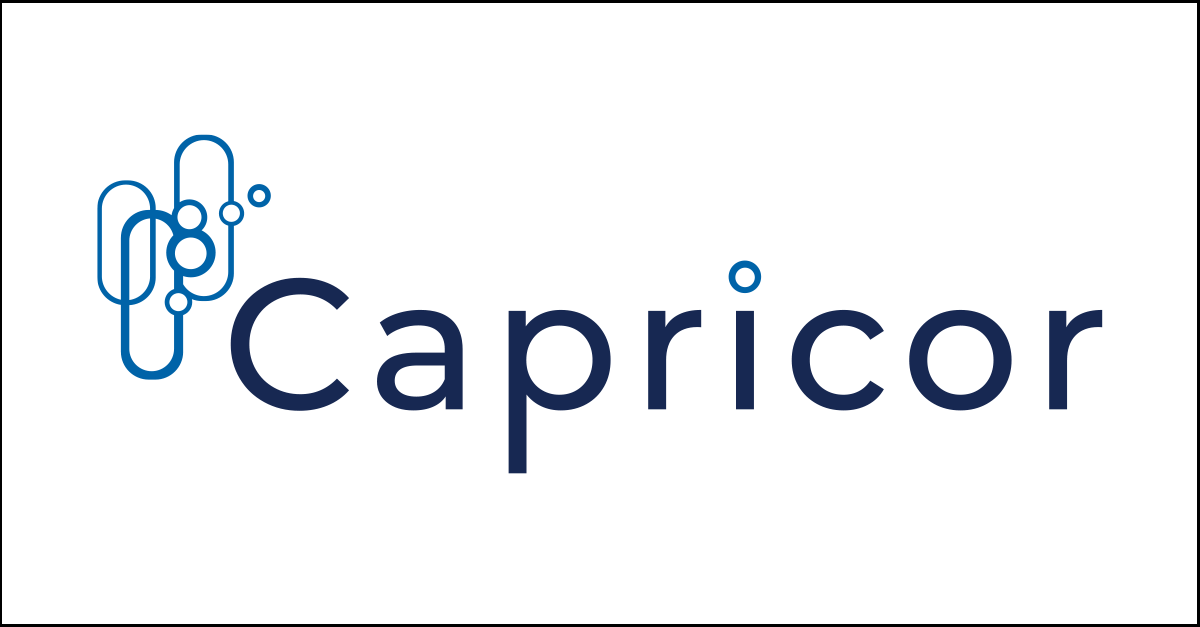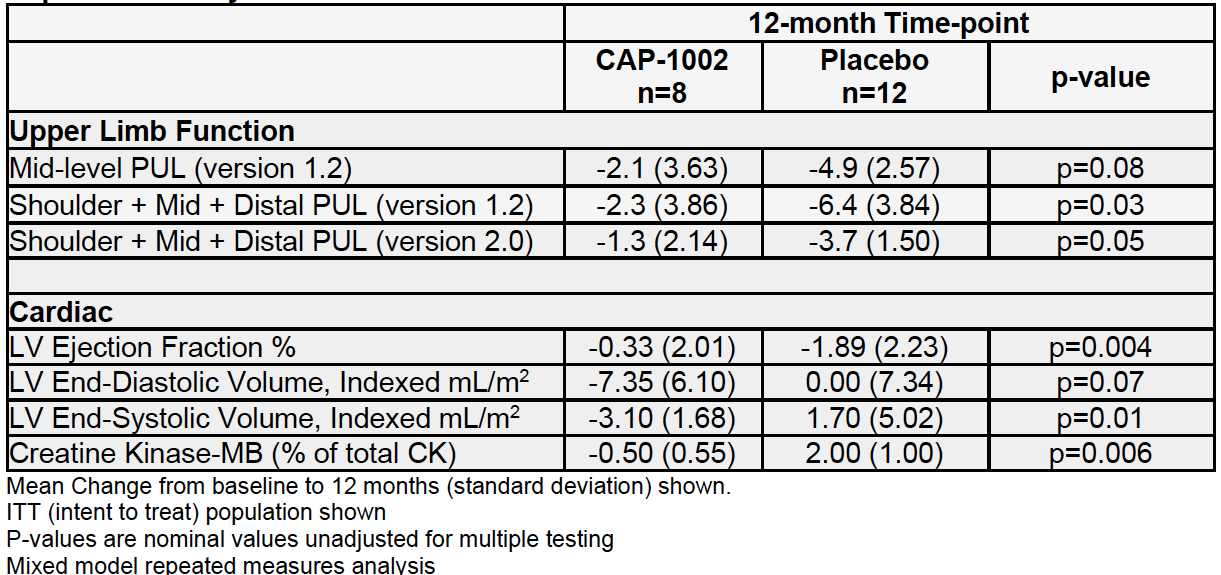
PPMD is excited to learn that Capricor Therapeutics has announced positive top-line 12-month results of the HOPE-2 clinical trial using CAP-1002 to treat non-ambulatory patients with Duchenne. Capricor has reported that the placebo patients in this trial declined consistent with natural history, but in the treated group, most patients were stable or improved throughout the one-year treatment period. PPMD looks forward to additional updates from Capricor and we are grateful that they are pursuing treatments to benefit people living with Duchenne who have limited treatment options.
Read the release from Capricor:
Capricor Announces Positive Top-Line Final Results from HOPE-2 Study in Patients with Duchenne Muscular Dystrophy Treated with Lead Candidate CAP-1002
-One-Year Results from Randomized, Double-Blind, Placebo-Controlled Study Demonstrate Improved Performance of Upper Limb (PUL) 2.0 (p=0.05)-
-First Ever Study in DMD that Correlates Stabilization in Cardiac Function with a Reduction in a Biomarker of Cell Damage-
-Company Planning to Meet with FDA to Discuss Pathway to Approval-
-To Host Conference Call and Webcast Today at 8AM ET-
LOS ANGELES, May 13, 2020 (GLOBE NEWSWIRE) — Capricor Therapeutics (“Capricor”) (NASDAQ: CAPR), a clinical-stage biotechnology company focused on the development of first-in-class biological therapeutics for the treatment and prevention of diseases, announced today positive top-line 12-month results of the HOPE-2 clinical trial using CAP-1002 to treat patients in advanced stages of Duchenne muscular dystrophy (DMD), a genetic disorder characterized by progressive weakness and chronic inflammation of the skeletal, heart, and respiratory muscles. Boys and young men typically lose their ability to walk in their teens and generally die of cardiac or respiratory complications by the 3rd decade of life. The data showed improvements in upper limb, cardiac and respiratory function with p-values less than p=0.05 in multiple measures.
The 12-month data from HOPE-2 showed statistically meaningful improvements in the PUL 2.0 in CAP-1002 treated patients (p=0.05) with a mean change of 2.4 points over placebo patients. With the exception of steroids, preservation of function in DMD is uncommon. The placebo patients declined consistent with natural history, but in the treated group, most patients were stable or improved throughout the one-year treatment period.
The performance of the upper limb (PUL) is a clinically validated measure that evaluates upper limb (shoulder, arm, hand) strength in patients who are generally non-ambulant. Retention of upper limb function is important for self-care and preservation of human dignity and has become a focus for physicians and advocates to find treatments to help these later stage patients. The FDA has suggested the use of the updated PUL 2.0 version as the primary efficacy endpoint in support of a Biologics License Application (BLA).
Craig McDonald, M.D., the national principal investigator for the HOPE-2 clinical trial and UC Davis professor and chair of the Department of Physical Medicine and Rehabilitation commented, “I am incredibly pleased with the outcome of the HOPE-2 trial which demonstrated clinically relevant benefits of CAP-1002 which resulted in measurable improvements in upper limb, cardiac and respiratory function. This is the first clinical trial which shows benefit to patients in advanced stages of DMD for which treatment options are limited.”
The data also showed global improvements in cardiac function as measured by ejection fraction (p=0.004) and indexed volumes (LVESV, p=0.01, LVEDV p=0.07). These are surrogate measures of cardiac function and are considered the “gold standard” in terms of relevance to long term outcomes. Remarkably, there is also a reduction in the biomarker CK-MB, an enzyme that is only released when there is cardiac muscle cell damage. In normal human subjects, there is typically no CK-MB measurable in the blood. It is well accepted that continuous muscle cell damage in DMD leads to pathologically high enzyme levels associated with cardiac muscle cell loss. HOPE-2 demonstrated a reduction in CK-MB levels as compared to placebo (p=0.006). This is the first ever study in DMD that correlates cardiac functional stabilization with reduction of a biomarker of cell damage.
Linda Marbán, president and CEO of Capricor said, “To date, there are no therapies to treat the cardiomyopathy associated with DMD. Based on the statistically and clinically meaningful improvements in these and other measures of skeletal, cardiac and respiratory performance, we have requested an End-of-Phase 2 meeting with FDA to discuss next steps and a pathway to approval of a Biologics License Application for CAP-1002 in DMD.”
Phase II HOPE-2 Study Design
HOPE-2 is a randomized, double-blind, placebo-controlled, Phase II clinical trial of the Company’s lead investigational therapy, CAP-1002, in boys and young men who are in advanced stages of DMD. Study patients were treated via intravenous delivery with either CAP-1002 (150 million cells per infusion) or placebo every 3 months. Data from a total of 20 patients was analyzed (12 placebo and 8 treated) at the 12-month time-point in the intent to treat (ITT) population. Approximately 80% of the patients were non-ambulant and all patients were on a stable regimen of steroids. Demographic and baseline characteristics were similar between the two treatment groups.
Study Results
Top-Line Efficacy Data:
Dr. Marban continued, “We are delighted with the final data from HOPE-2. It has met our expectations in terms of clinical meaningfulness in this population of patients where treatment options are extremely limited. In HOPE-2, CAP-1002 was delivered by intravenous infusions given quarterly. The data suggests that CAP-1002 could delay the progression of DMD. We are excited to share this data with FDA and discuss next steps towards commercialization. We have had tremendous support from the DMD advocacy community and we are grateful to the patients and families who participated in this study so that we could reveal the impact of CAP-1002 in treating DMD.”
Safety Update
CAP-1002 was generally safe and well tolerated throughout the study. With the exception of hypersensitivity reactions which were mitigated with a common pre-medication regimen, no safety signals were identified in the HOPE-2 trial.
The FDA has granted Capricor’s CAP-1002 RMAT and Orphan Drug Designation, and the FDA has also granted a Rare Pediatric Disease Designation to CAP-1002 for DMD. The Rare Pediatric Disease Designation, as well as the Orphan Drug Designation previously granted, covers the broad treatment of DMD. If Capricor were to receive market approval for CAP-1002 by the FDA, Capricor would be eligible to receive a Priority Review Voucher. This is the second clinical trial investigating CAP-1002 showing similar results in DMD. Capricor completed the HOPE-Duchenne (Phase I/II) trial published in Neurology, the medical journal of the American Academy of Neurology in 2019.
The Company has initiated a technology transfer with a leading global CMO to prepare for commercial manufacturing of CAP-1002.
Conference Call and Webcast Details
Capricor will host a conference call and webcast with slides today, May 13, 2020, at 8:00 a.m. ET to discuss the top-line results of the HOPE-2 study. To participate in the conference call, please dial 855-327-6838 (domestic) or 604-235-2082 (international) and reference the access code: 10009621.
To participate via a webcast, please visit: http://public.viavid.com/index.php?id=139843 to view the slides. The webcast will be archived for approximately 30 days and will be available at http://capricor.com/news/events/.



 by: Parent Project Muscular Dystrophy
by: Parent Project Muscular Dystrophy


